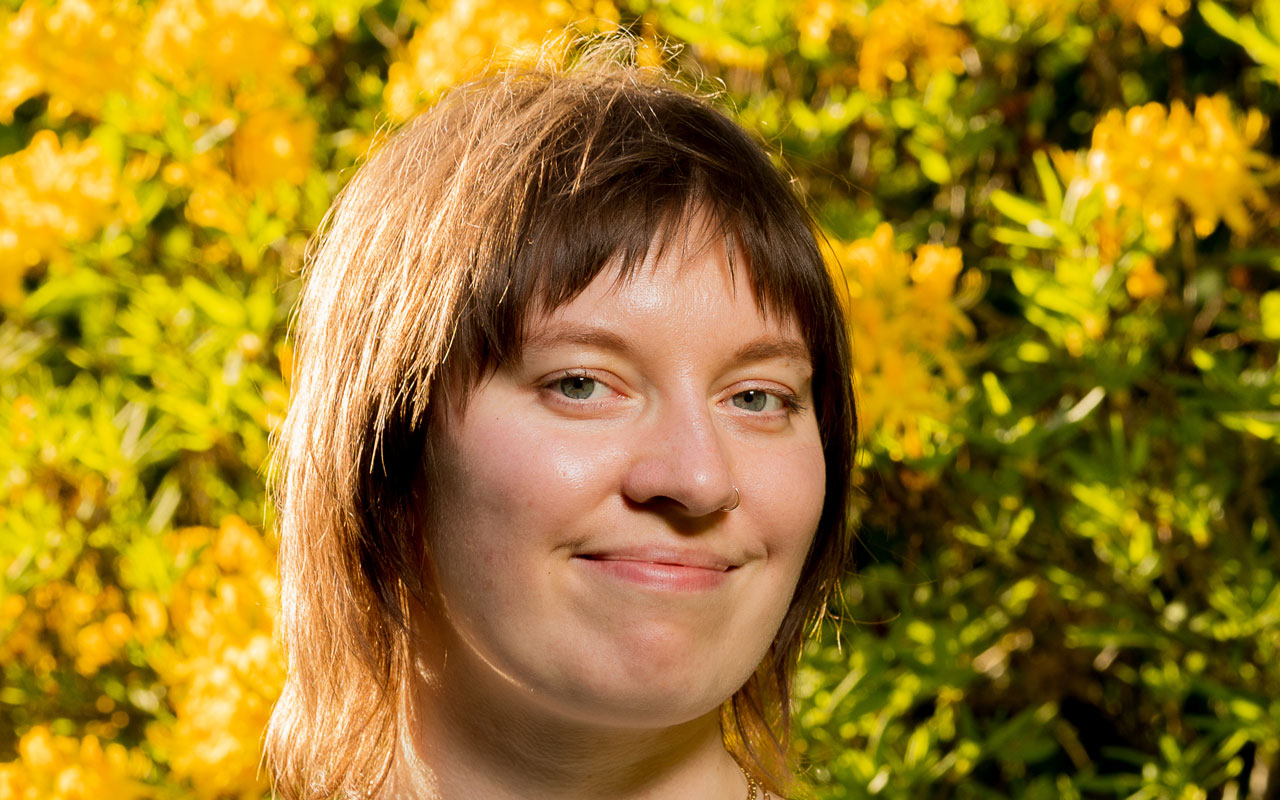
Haley Freedlund photo by Daniel Sheehan
When trombonist and tour manager Haley Freedlund was a junior at Cornish College of the Arts, they participated in a rehearsal as part of the Cornish large ensemble with multi-instrumentalist and avant-garde jazz titan Marty Ehrlich, who was a visiting artist at the school in the spring of 2014. As he presided over the ensemble, Ehrlich offered up a spontaneous nugget of wisdom, in a moment that Freedlund calls one of the most impactful during their time at the school.
“I was really struggling with comparing myself to others…and he said something that just like really knocked me on my ass,” said Freedlund. “It was simple, and it wasn’t directed to me specifically, but he just said that there are different musicians for different gigs. In the years after that, I really started to find my voice as a musician and figure out what kind of trombonist and performer and improviser I wanted to be.”
Ehrlich’s assertion that there is space for everyone’s distinct contributions encouraged Freedlund to reject comparison and reach for their authenticity as a musician and queer person. It also underpins the sort of jazz and free improvisation community Freedlund strives to create in their work as a band member, event producer, and tour manager.
At the time they heard Ehrlich’s words, Freedlund, who’s originally from Beaverton, Oregon, was in their third year at Cornish, and one of only two trombonists in the entire music program. Likewise, it was around this time that Freedlund was just beginning to understand their queerness.
Today, Freedlund is deeply in touch with their conversational, exploratory musical voice. They play regularly with Wayne Horvitz’s Royal Room Collective Music Ensemble, Tom Varner’s Sound Vespers, and compose music for their band, Friends & Heroes. Each group has its own distinct flavor but is centered in the stretched, conceptual forms, radical harmony, and collective improvisation of avant-garde jazz. From within these unique collectives, Freedlund’s voice can be heard calling out and sharing, but always in deference to minimalism and the moment.
“I think of my voice and my body as an instrument first and the trombone as a megaphone to that. My approach is listening-forward. I try to make sure I’m having a conversation and responding to how other people are playing or expressing themselves,” said Freedlund.
As of 2017, Freedlund also curates the bi-weekly Racer Sessions, a regular jazz event and jam session at Cafe Racer that was begun by a group of UW jazz students in 2010. Occurring every first and third (and sometimes fifth) Sunday, Racer Sessions begins with a featured artist who contextualizes their performance with a short explanation of creative approaches used. From there, a jam session takes flight, shaped with the intention that participants will draw on the concepts that the featured artist has introduced.
Since taking over the production and curation of the session, Freedlund has put heavy focus on diversity and inclusion, particularly after noticing that the archive of presenters was heavily white and male and that many first-timers felt the session was intense and exclusive. With that in mind, Freedlund has strived to expand the audience of Racer Sessions in a variety of ways, including encouraging more beginning improvisers to get involved, making the session all-ages and family-friendly, and seeking out new artists to play instead of simply booking the artists who come to them.
“I got more involved in my music scene and started reaching out to people who wouldn’t necessarily consider themselves improvisers,” said Freedlund. “There was pushback. There were a lot of people who participated in Racer Sessions, like way back in the day that felt quality of the playing was way down from where it used to be. Okay, but there are also people playing at the session now that wouldn’t have otherwise felt comfortable.”
When they aren’t performing and curating Racer Sessions, Freedlund also works as a tour manager for groups in the jazz and creative music space that align with their values. In fact, they just got off a 10-week stretch touring with Songs We Love, a journey through 50 years of jazz songs presented by Jazz at Lincoln Center, and for the last year or so they’ve worked with Grammy-winning vocal band Roomful of Teeth. Freedlund also offers that work on a sliding scale, so that their services are accessible to a wider swathe of artists.
“All the work I do is sliding scale. If I believe in the project then I usually do what I can to help make it happen,” said Freedlund.
As Freedlund stands on the precipice of their 30th birthday, they hope to share more of their own compositions and artistic identity with the world in the future. This musical desire is intimately intertwined with Freedlund’s own self-discovery, which intensified during the pandemic with the full realization of their genderqueerness.
“I mean, I’ve always felt like androgynous. But, through the pandemic, I’ve been able to spend more time meditating on who I am,” said Freedlund. “And as I’m getting comfier with my queerness, I’m also getting comfier sharing more of my own musical and artistic identity with the public, and that’s what I want to focus on more as I enter a new decade.”